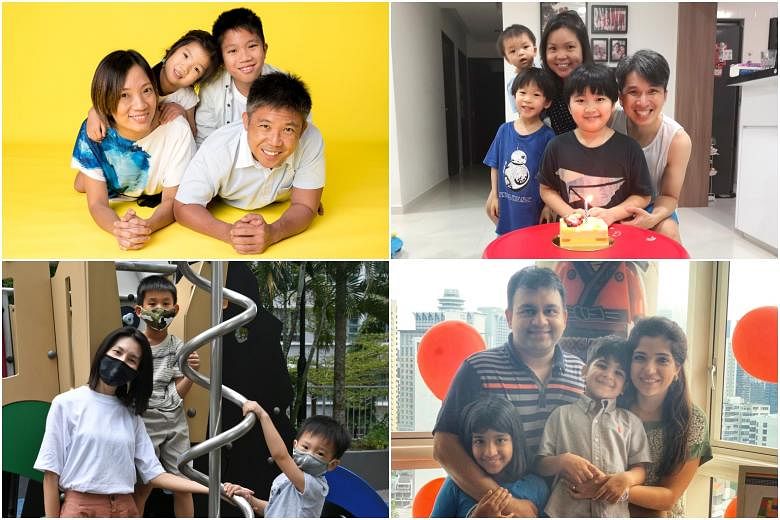SINGAPORE - Azel Tan, seven, and his brother Aden, three, love spending time outdoors. They had withdrawal symptoms when recreational facilities had to close during the circuit breaker.
Their mother Serene Wu, 36, recalls their shock when she showed them the news.
"When they saw tape barriers surrounding our usual playground, reality sank in. Aden asked many questions about why he couldn't play with his friends. Azel was devastated he could not go for his in-line skating lessons or play soccer with his neighbours at the open field downstairs," says Ms Wu, a teacher-turned-mumpreneur.
Like Azel and Aden, children across the island have had their routines upended by the pandemic. More are finding themselves lost in the shifting tide of changes across all aspects of their lives, with parents who may be too busy fighting their own Covid-19 calamities to steer them to safety.
In such a volatile and uncertain environment, experts say it is vital that children develop resilience to push through challenges.
For a start, parents can empower their kids to do so by creating home routines to make them feel safe, modelling adaptability and sparking conversations about pandemic heroes.
Data from community organisations document the evolution of children's responses to the crisis across the last three months.
Tinkle Friend, a befriending service for primary-school children, saw calls and chats more than double when the circuit breaker started, says Ms Ann Hui Peng, group lead for children development at the Singapore Children's Society.
It received an average of 15 calls and online chats a day from January to March. This spiked to an average of 37 a day in April and May. The number held steady at an average of 36 a day from June 1 to 26.
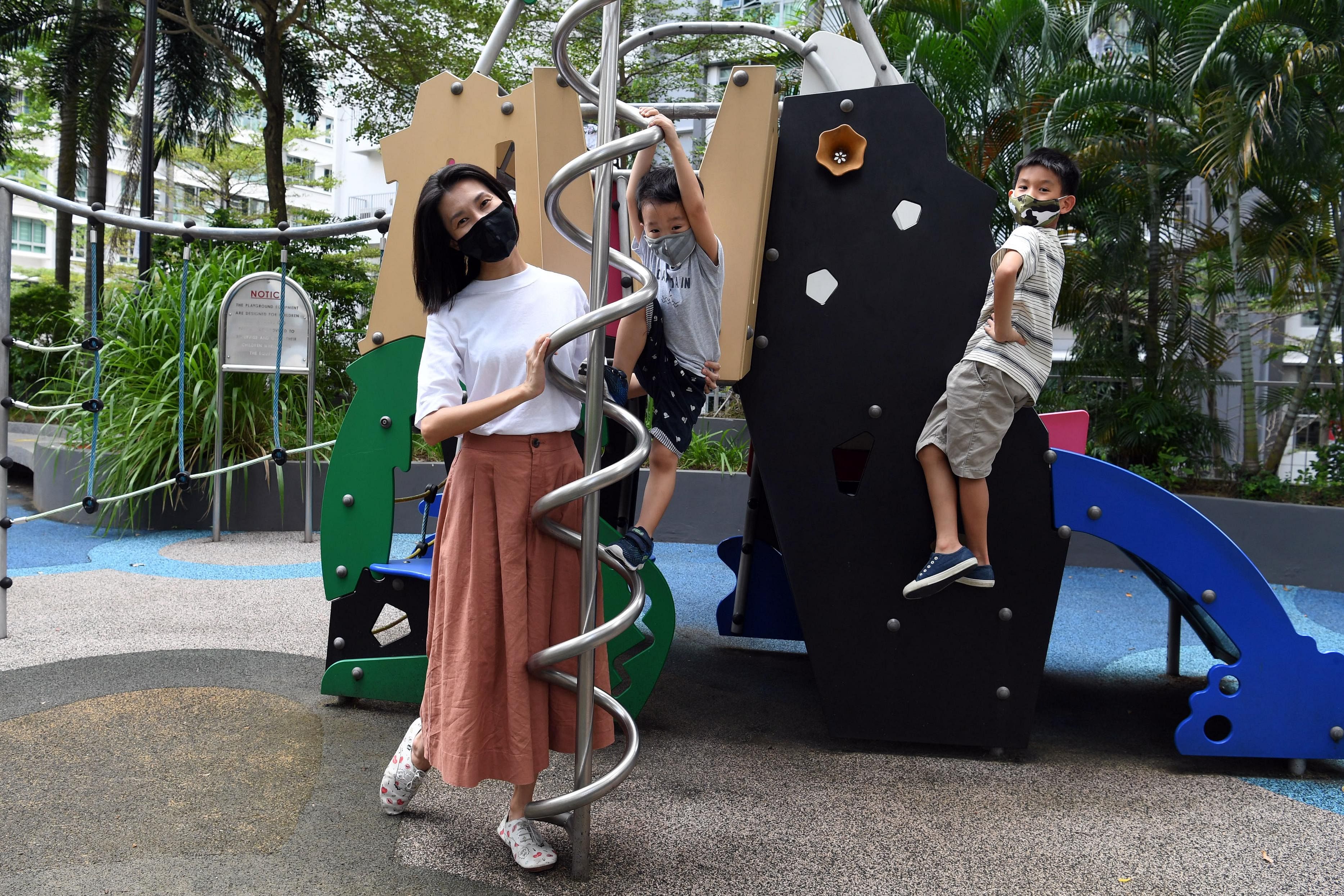
In April, children called with concerns about Covid-19, home-based learning (HBL) and feelings of boredom, Ms Ann says.
A month later, some kids contacted Tinkle Friend because they were looking for others to chat with during the school holidays.
Others were worried about how the prolonged break would affect their Primary School Leaving Examination results.
Calls and chats last month centred on back-to-school stress, including being overloaded with homework, and safety measures that limited interactions with their peers.
Ms Andrea Chan, head of mental health and intervention at charity Touch Integrated Family Group, says its counsellors also reported more cases of anxious kids. They were affected by their "highly distressed" parents who have lost jobs or had their pay cut.
"If children sense tension and anxiety at home, they may be likely to take on that emotion too, which can cause them a lot of stress," she says.
Its Touchline helpline also fielded calls from Primary 6 pupils seeking help for the "overwhelmingly negative emotions they were experiencing" on the cusp of sitting the national examinations.
SELF-CARE FIRST
Fear of the unknown can be intense for both children and adults, observes Ms Vyda S. Chai, a clinical psychologist with Think Psychological Services, a private psychological and counselling practice.
As children look to their parents for support and guidance, mums and dads should make sure they are taking care of themselves first. Only then will they be "emotionally equipped and available" for their kids, says Ms Chai.
In a time of volatility, it also makes sense to establish predictable routines at home. "Children, like adults, appreciate knowing what is going to happen. This introduces some degree of control during periods of uncertainty," she adds.
Ms Wu, who co-founded online shop Love Bonds, addressed her sons' laments of boredom during the circuit breaker by drawing up two lists - what the family needed to do and what they wanted to do.
The first list included simple chores for the kids, homework and reading. The second list of wants, which her sons helped to draw up, ranged from science experiments to do-it-yourself obstacle courses.
"One thing my husband and I learnt is that we don't need very much for our children to be happy. They are excited by and content with very simple things like tent play, water play and read-aloud sessions with me or just drawing and painting," says Ms Wu, who is married to a public servant.
During periods of confinement, the mood at home can quickly "spiral" downwards, says Ms Chai, so it is important for parents to model coping strategies for their children.
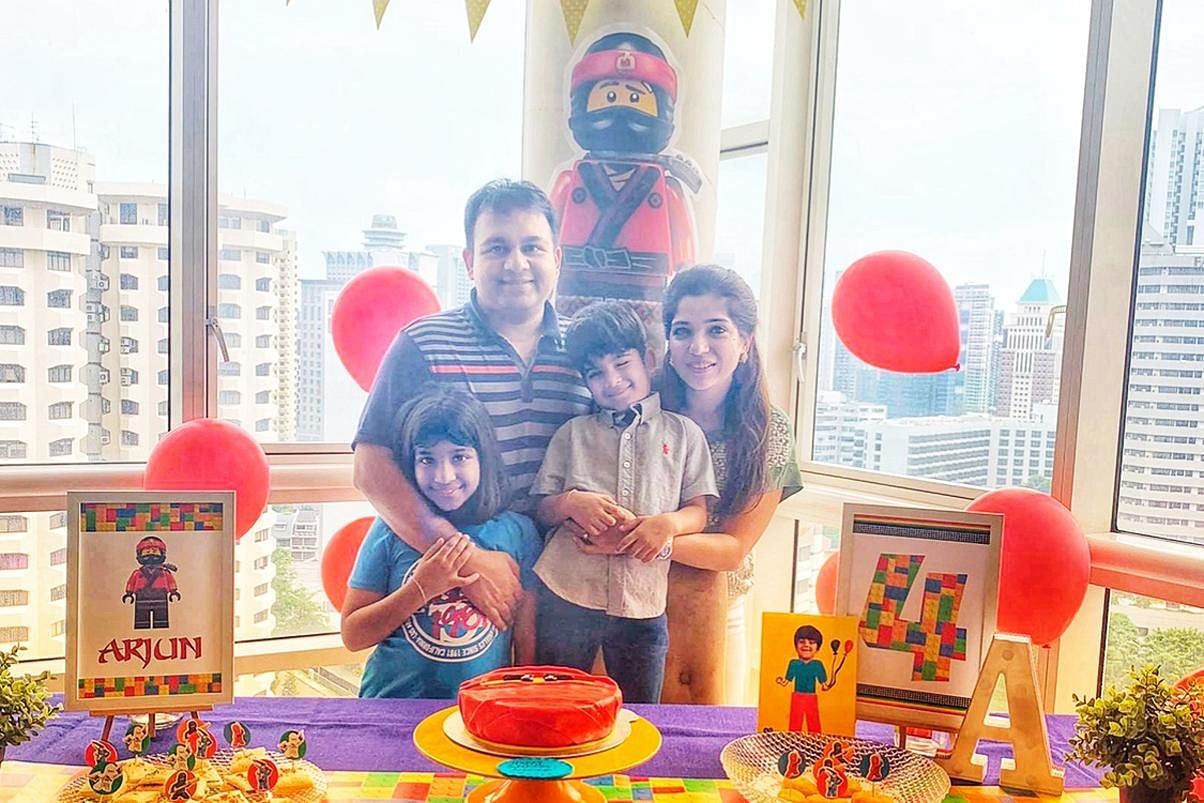
Executive/life coach Ruchi Parekh, 39, had to do just that when her son, Arjun, became upset when his friends could not attend his fourth birthday party during the circuit breaker.
She lifted his mood by planning a Lego Ninjago-themed celebration and made his favourite food. Even though he had only his parents and sister that day with him, Arjun said it was his "best birthday ever", says Mrs Parekh.
On another occasion, her daughter Anaya, seven, refused to join her school's Zoom call. Sensing that something was amiss, Mrs Parekh sat down with her and found out that Anaya was sad about one of her friends leaving the country.
"This has been my biggest lesson from the pandemic - allowing my children to just be themselves and giving them the space to express their feelings instead of telling them what to do."
"Children go through myriad emotions and, very often, they don't know how to express them. That's when they throw tantrums, have meltdowns or just become difficult. As adults, it is our job to understand, give them the space to deal with things and gently nudge them along the way."
TEACHABLE MOMENTS
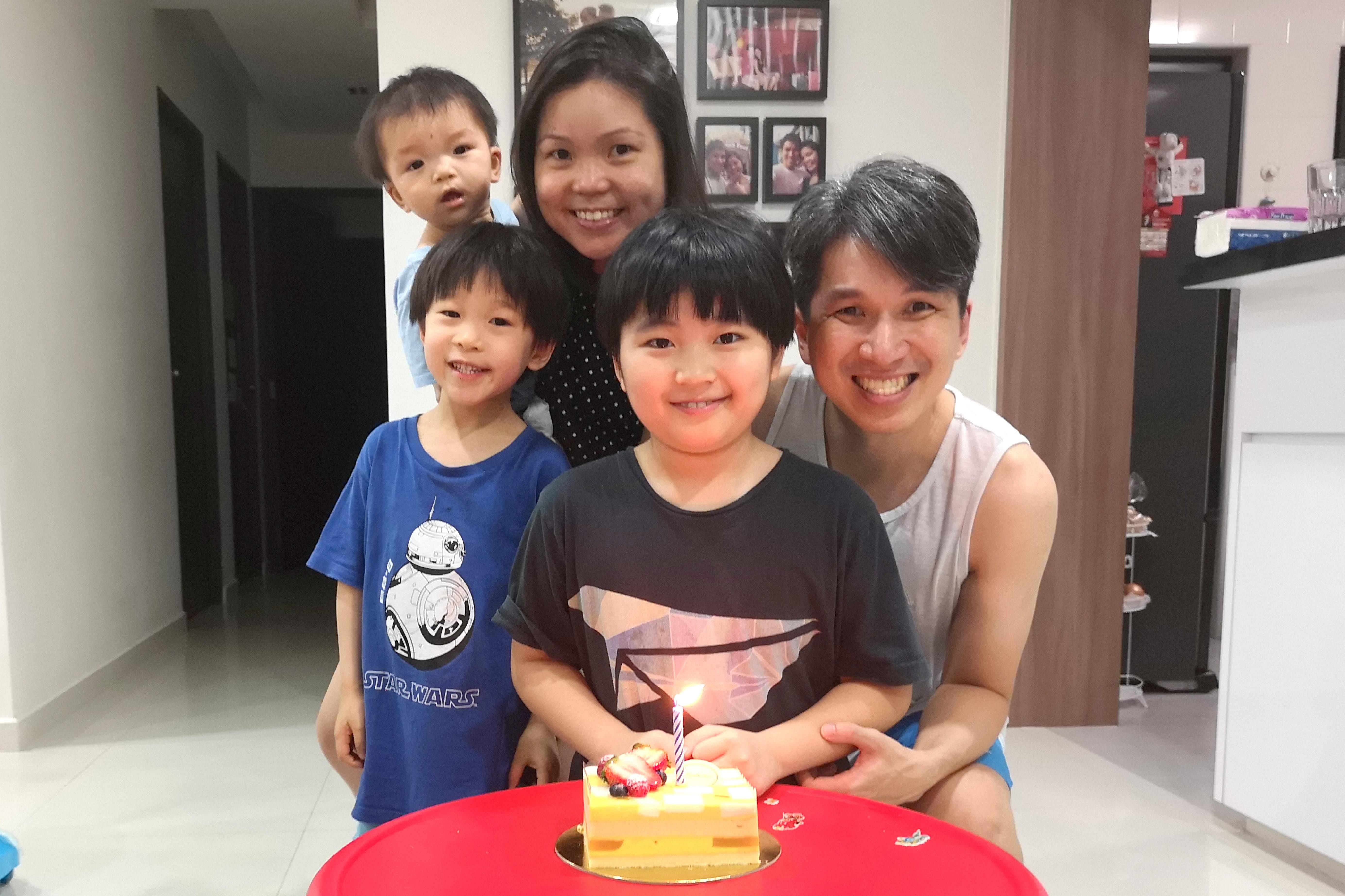
Empowering his kids to manage challenges is an ongoing process for Mr Dennis Dew, 38.
He has weathered personal crises of his own, including a heart attack last year and scrambling to pivot after the pandemic affected sales at his collectible toy shop, Dew Toy Store.
His two older sons, aged six and 10, have the same heart condition as he does, so he treads a fine line between encouraging them to see themselves as equally able as other kids and reminding them not to over-exert themselves. He also has a one-year-old son.
The former auditor recalls an incident about four years ago at an indoor playground involving a rowdy boy who pushed his middle son, Shao Yi. After consulting his father, eldest son Wen Shao walked up to the bully with his brother and both asked him to stop.
"It was a heart-warming moment for me because of how they stood up for each other and were able to confront their problems," says Mr Dew.
He and his wife, a polytechnic lecturer, make it a point to share documentaries about the pandemic with their older kids.
"It is a good lesson for them on how people can overcome adversity regardless of the challenges thrown at them. And also to appreciate that while our life is affected, we should be grateful that we still have one another. In my sons' own words, 'Bros forever'."
Similarly, Ms Wu, who was a junior college teacher for 11 years, shares inspiring newspaper articles on the pandemic with her kids and seizes moments to teach them the concept of "locus of control".
"There are things we cannot control (like situations around us, Covid-19 spreading or the spelling test being difficult), but what we can control are our attitudes, actions and thoughts. So we wash our hands, are civic-minded, practise safe distancing, study hard for our spelling and put in our best effort."
"When my son struggles to type out sentences during HBL, I don't solve his problem. I am there to remind him that when it's hard, that's an opportunity for growth and learning. When he succeeds, I praise him for his efforts and not giving up."
To prevent anxiety, parents can also teach their little ones about healthy coping strategies, says Ms Gloria Ng, head of community services and programmes at the Singapore Children's Society.
These include deep breathing and muscle relaxation exercises, engaging in leisure activities or grounding exercises, all of which can be made into fun parent-child sessions.
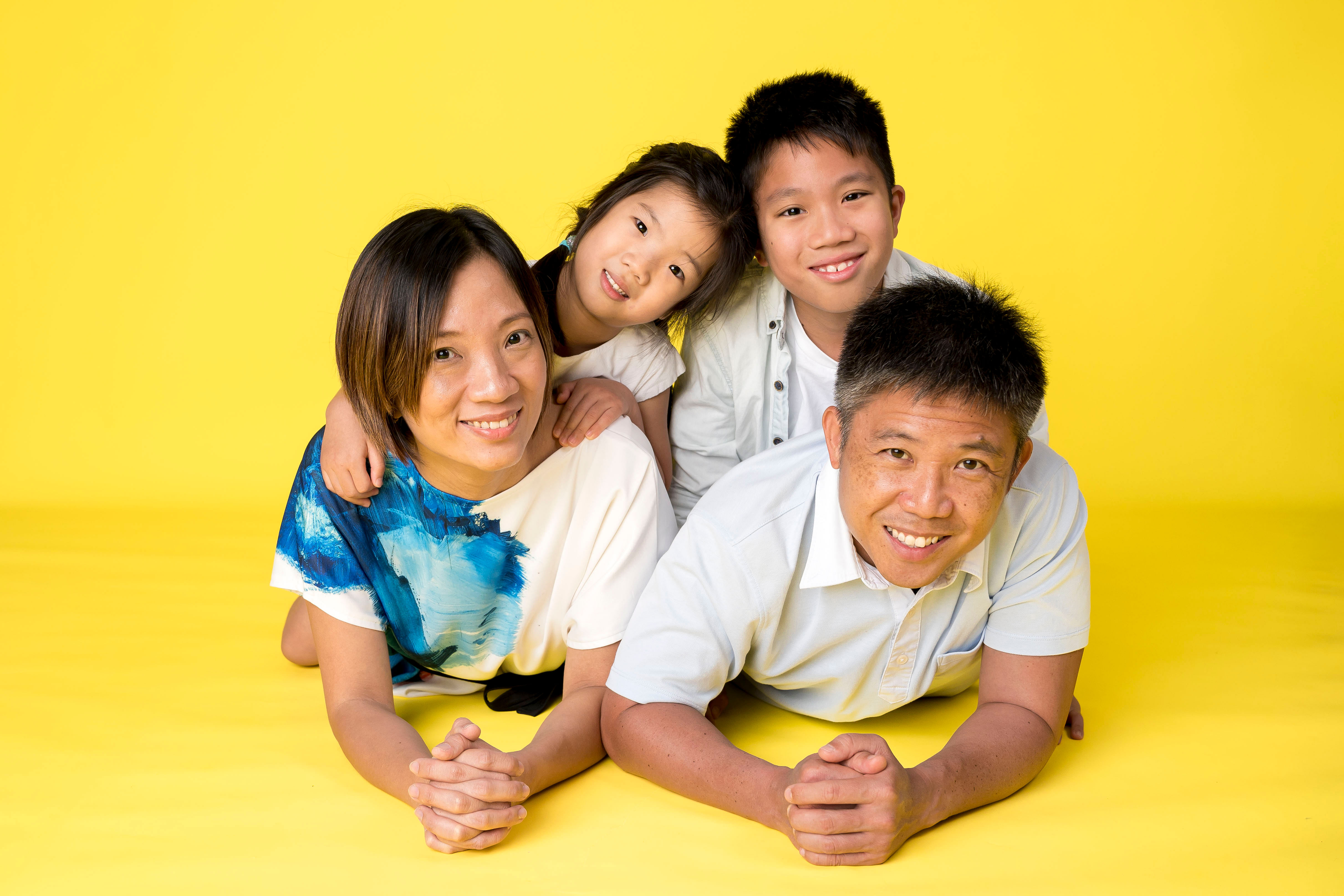
In some cases, the downtime afforded by the pandemic has given kids the space to find their footing on their own terms, as mummy blogger Serene Seah, 37, attests.
Her six-year-old, Vera, had been taking swimming lessons since August last year, but could not overcome her fear of jumping into the big pool.
When classes resumed last weekend, Ms Seah was concerned about how she would fare after a two-and-a-half-month break, as well as a change in coach, but kept the mood positive.
Vera surprised her by doing so well that she may be able to take her first swim test soon. "Her adaptability to the change caught me by surprise," says Ms Seah, who also has a 12-year-old son.
Vera, who is under the Learning Support Programme for weaker learners in Primary 1, earned her teacher's praise for keeping up well during the HBL period as well. During the circuit breaker, she also overcame her fear of riding a bike.
"Do not underestimate the resilience in them," says her proud mum.
